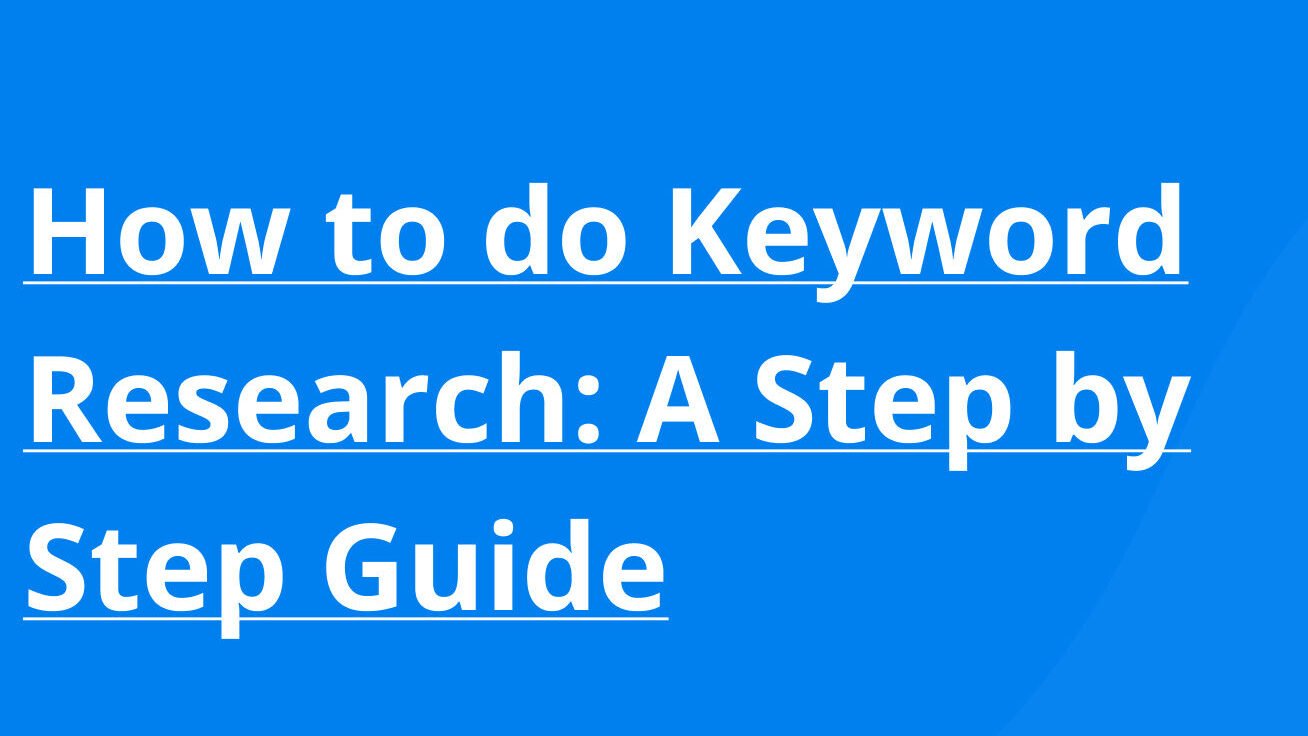What is keyword research?
Keyword research is the process of finding the words and phrases that people use when searching for information and content online that is relevant to your site and your business.
When we talk about digital marketing, keyword research will form the foundation of your content, conversion optimization, link structure, and other SEO troubles.
Finding and ranking for the right keywords will make or break your site. Keyword research will not only show you which keywords you should focus on, but also what your customers want and need from your products.
Keyword research will help you sell more products, but it will also help you support and retain more customers.
Importance of keyword research
The role of keyword research in SEO
Keyword research is the foundation of SEO strategies, and is the first step in determining which keywords your company’s website will rank for. It is done to find out what keywords your potential customers are searching for, and what keywords they use to gather information before directly searching for keywords for your products or services.
If this keyword research is not done accurately, even if you achieve a high ranking through SEO measures, it will not lead to inquiries, and you will only receive access that does not lead to purchases.
The role of keyword research in listing ads
Keyword research also plays an important role in listing ads. Listing ads are ads that appear when users search for specific keywords, and by targeting the right keywords, you can maximize the effectiveness of your ads. Keyword investigation is essential to find out what words possible guests use when searching for products and services.
In addition, since the cost per click (the cost started per click) differs for each keyword in listing ads, you need to conduct keyword research while also taking into account your advertising budget and the advertising status of your competitors.
What is a good keyword?
A good keyword is a word, or set of words, that helps Google locate and understand your website when a search query is made by an Internet user. This keyword should match the content of the page.
For us to be capable to say that a keyword is effective, it must:
- Generates impressions and web traffic
- Performs conversions
- Be relative to the runner and your visitants
Types of keywords

Generic keywords (or head keywords)
Generic, or head, keywords are keywords that are usually made up of a maximum of three words. They are highly sought after but are also subject to high competition. The user’s search intent is rather broad, and the conversion rate is rather low.
Long tail keywords
Long tail keywords are more specific terms. They are usually more than three words long, have less search volume, and therefore less competition. However, the user’s search intent will be specific and the conversion rate will be higher.
Semantic keywords
Semantic keywords correspond to keywords that are closely related to your main keyword. This is the entire lexical field related to your initial theme, which will allow you to target subcategories of your theme, and to have a rich vocabulary to use in your content. Like long tail keywords, these keywords have lower search volume and competition than general keywords, but the following has a specific search intent, which allows a high conversion rate.
Event keywords
Event keywords are trending search phrases related to current events. These keywords will have a high propensity for their search volume during the current event, then it will quickly exhaust itself when users move on to another event. So we have a keyword with an exponential search volume, medium competition, a specific search intent for a high conversion rate.
Evergreen keywords
Evergreen keywords. These are search terms whose volume is stable and tends to remain the same. Evergreen keywords are trending and searched for at all times, the main advantage of these keywords is the ability to maintain the traffic obtained over time, thanks to regular updates of this content. Then, the search volume and competition are average, with specific search intentions and thus a high conversion rate.
Local keywords
Local keywords are keywords that are easy to identify because they include a geographic position intended to target searches made by people who live in a certain area. For example, we can find the name of a city, a neighborhood or even a department. The objective of this type of keyword is local SEO. The number of searches and competition are low, the search intent is specific and the conversion rate is high.
General keywords
General keywords are generally composed of a single word, for example “shoe”, “car”, “travel”… The traffic is generally not very qualified and the keyword is often very competitive. They are therefore not to be used as a priority.
Information keywords
Informational keywords are those formulated in the form of a question that your content should answer. These keywords allow you to position yourself as an expert on terms with high search volume, low competition, and qualified traffic. For example, “how to make a beard soft?”
Intent, action, or transactional keywords
Intent, action or transactional keywords correspond to keywords that consist of triggering an action in the user. In general, they are intended to find an item, a service, a product, with the aim of reserving it, buying it. The search volume of these keywords is lower, the competition is high and this type of keyword is filled with paid ads.
Steps to drive traffic and boost conversion

1. Clarifying business goals
First, clarify the purpose (business goal) of your keyword research. For example, set a goal that is easy to imagine, such as “increasing brand awareness,” “increasing inbound traffic,” or “increasing sales of products and services.”
2. Understand your target audience
Target Audience by clarifying the keywords they are using to search, we can understand their interests, trends, and needs.
Also worth reading: What is a target audience? Its meaning, importance, how to define it, and its difference from personas.
3. Use Keyword Research Tools
Using a keyword research tool, you can research the search volume, competition, and relevance of suggested related keywords, and also get ideas for new related keywords.
4. Keyword evaluation
Evaluate and adopt the keywords you have researched. First, extract big keywords (general keywords that are the main focus) and mid-keywords (keywords consisting of two words that are more specific than the big keywords), and from these, select the ones that are appropriate for your business goals and target audience.
5. Consider long-tail keywords
Long-tail keywords are keywords that have less search volume than big and middle keywords and consist of three or more words. They are keywords that meet specific needs and are an important point for differentiation from competitors.
6. Competitive analysis
Analyze which keywords your competitors are searching for and find out which keywords are highly competitive and which are less competitive.
7. Develop a Keyword Strategy
Formulate content and SEO strategies based on keywords extracted by your company and the competitive situation. Specifically, plan which keywords to incorporate into which web pages and content.
8. Regular monitoring and improvement
The market is dynamic and keyword research is constantly changing, so you need to adjust your keywords to keep up with your competitors’ moves and the latest trends, so it’s important to regularly monitor your keyword performance and make improvements.
Benefits of keyword research

Marketing Trend Insight
Conducting effective keyword exploration can give you with perceptivity into current marketing trends and help you center your content on relative questions and keywords your following is in search of.
Traffic Growth
When you identify the best- fitting keywords for the content you publish, the advanced you ’ll rank in search machine results the further business you ’ll attract to your website.
Customer Acquisition
Still, you can meet their requirements and give them with a call- to- action that will lead them into the buyer trip from the mindfulness stage to the point of purchase, If your business has content that other business professionals are looking for.
Tools for keywords research
These are some tools for keyword research:
Yooda Insight has a tool to find keywords associated with a search term, it gives you access to several related pieces of information.
Ubersuggest is a software that suggests keywords based on a specific search term, and analyzes the ranking of your site and the keywords on which you are positioned.
Answer the public is a software that allows you to compare, in many countries, related results and secondary keywords from a search term. The advantage is that it suggests keywords in a “tree” format, with the search intent terms and the full search terms.
1.fr is a software that allows you to analyze your different web pages to see what type of content comes out. It suggests words to add to your text to make your content richer. By deduction, it classifies the topics that Google will associate with your text according to the presence of keywords in the content.
Yourtext.guru is a software that assists you in creating your web content. It performs in-depth semantic analyses, designed to offer you semantic cocoons, keyword ideas and to monitor competition.
Conclusion
Keyword exploration is a critical element of any successful digital marketing strategy. It not only helps in understanding and reaching your target audience but also enhances your SEO efforts, driving more traffic and increasing conversions. By continuously refining your keyword strategy and staying abreast of industry trends, you can ensure sustained growth and visibility for your business.







